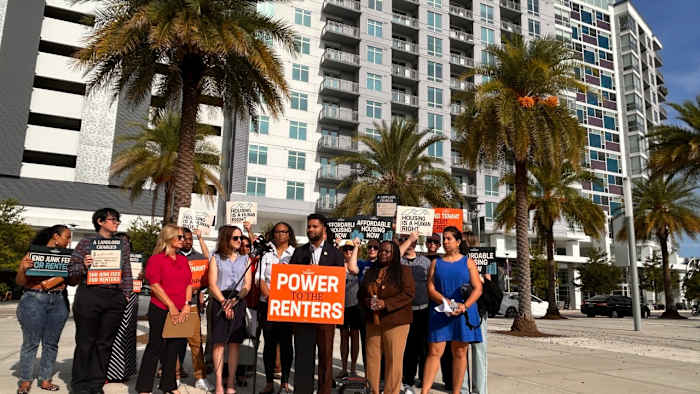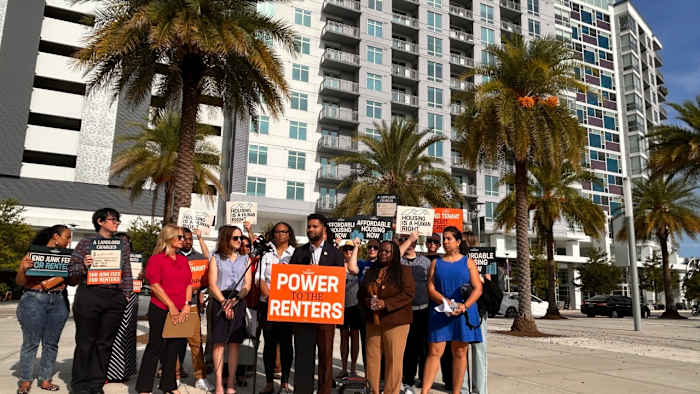Share this @internewscast.com

ORLANDO, Fla. – Symphony Betters knows all too well the kinds of fees that can come with renting a place to live.
The Downtown Orlando resident said she got an apartment for $1,600 a month, but once fees were added, the price was far higher.
“I wanted to stay before $1,800, but unfortunately, I was above $1,800 after the fees,” Betters said.
We asked News 6’s social media followers what kind of fees they pay on top of their rent.
Complaints arose over fees for pets, parking, trash valet services, pest control, and package handling. A tenant mentioned being charged a processing fee to pay rent online, despite it being the sole payment option.
Rep. Maxwell Frost, D-Orlando, said the fees are adding cost burdens to an already cost-burdened rental market.
Recent Census reports indicate that 61% of renters in the Orlando metro area allocate more than 30% of their monthly income to housing expenses, positioning Orlando as one of the nation’s most cost-burdened regions for renters.
“Folks are sick and tired of being squeezed at every turn,” Frost said.
Accompanied by affordable housing and homelessness advocates, Frost held a news conference on Friday to unveil two legislative proposals he claims will address the issue.
The End Junk Fees for Renters Act would:
-
Ban application and screening fees
-
Require late fees to apply as a credit to next month’s rent
-
And require landlords to disclose information to rental applicants, including:
-
Total amount due each month, including fees
-
Year-over-year rental increase percentages
-
Ongoing pest and maintenance issues
-
Any past or current lawsuits with tenants
-
“We need to put more power into the hands of tenants to make informed decisions on one of the biggest things, one of the biggest decisions you’ll make as a person, which is deciding where you’re going to live. And this is keeping so many people out of it,” Frost said.
Frost also announced the End Credit Screening for Renters Act, which would ban landlords from using credit scores and consumer reports when screening potential tenants. The bill has not been posted to Congress’ website yet.
Barriers to housing
The bills are partly inspired by Frost’s own experiences. Frost famously could not get an apartment at the start of his first term in Washington because of his credit score. He was also priced out of his apartment while campaigning for office.
“I had the money, but I was coming up to the barriers to housing, which are all too often an issue here in Central Florida and across the country as well,” Frost said.
Recent U.S. Census data shows 49.7% of the 42.5% million renter households in the country spend more than 30% of their income on housing.
[VIDEO: Homelessness in Orlando ‘literally killing’ seniors, advocates say]
According to Rent.com, which tracks market trends, the average rent for a 1-bedroom apartment in the Orlando area is $1,409 a month. That’s before fees are added.
Then there’s the cost to just get into an apartment – application fees that can now cost hundreds of dollars, on top of security deposits, and paying first and last month’s rent.
Zeynep Portway, CEO of the Samaritan Resource Center in east Orange County, says those fees are also pricing people right onto the streets. She talked about one of her clients, a 67-year-old man on a fixed income who needed to find a new home went his rent went up by $400.
[RELATED: Stories about homelessness in Central Florida]
“He had a little bit of a savings, a little rainy day fund, which he thought was going to help him out,” Portway said. “He went out to apply for other apartments that he could afford. Well, every time he paid an application fee that had background checks, screenings and other fees attached to it, he was paying $300, $400 at a time.”
Portway said the client ran out of money, moved out of his apartment, and started living in his car.
“Those application fees are what put him on the streets,” Portway said.
Samaritan Resource Center was able to get the client into affordable housing. The group helped with the cost to move in, including the application fees, the deposit, and the first month’s rent. Those higher fees eat into the funds SRC has, reducing its ability to help more people.
Homelessness advocates say Central Florida’s affordable housing crisis is largely responsible for the growing number of people experiencing homelessness for the first time.
[VIDEO: New affordable housing complex opens in Altamonte Springs]
According to the Homeless Services Network of Central Florida, 75% of people who are homeless at a given time are homeless for the first time, with many priced out of homes.
In this year’s Point-in-Time Count, a census of the area’s homeless people, seniors and children made up more than 40% of the homeless population.
Frost points to a 2020 report by the U.S. Government Accountability Office that found “median rent increases of $100 a month were associated with a 9% increase in homelessness.”
“These issues are directly connected,” Frost told News 6. “And so as we fix the housing crisis, and we are able to make it so you can actually afford to live where you work, you can actually afford to live in Central Florida. We’re actually going to see homelessness go down as well.”
Poor credit compounds the issue
Portway also supports the End Credit Screening for Renters Act. She says she’s had clients struggle to get out of transitional housing because of their credit.
“(The bills) don’t solve every issue, but they’re a step forward towards a system that doesn’t punish people, people for struggling, that recognizes that everyone deserves a fair shot at a stable place to live,” Portway said.
Frost says it wrong to use credit scores in determining whether someone will pay their rent, since credit reports often contain inaccuracies. A 2024 Consumer Reports study with 3,200 participants found 44% discovered problems with their credit report.
A U.S. Consumer Financial Protection Bureau report in 2024 also found credit reporting agencies were not doing enough to make sure reports were accurate because they continued to rely on information from groups that were unreliable.
But Frost also points to a human factor.
“When people fall on hard times, the first two things they cut from is not housing or rent,” Frost said. “The first thing they cut from is food and then medicine. In fact, many surveys show that the last thing people cut from when they fall on hard times is their rent.”
Chances of passing
This is the second time Frost has filed the End Junk Fees for Renters Act in Congress. The first time Frost filed it, in 2023, it didn’t get very far.
Frost is hopeful this time because he has support in the U.S. Senate, with Sen. Jeff Merkley, D-Oregon, filing a companion bill. Frost’s bill in the House has 20 co-sponsors. However, they are all Democrats. Not a single Republican has signed on. Frost blamed a toxic atmosphere in D.C., making it hard for Republicans to sign on to Democratic legislation.
Frost is also not the only person sponsoring bills on the issue. A search of the Congress.gov website shows 105 affordable housing bills, and 151 bills on homelessness, with few making it to committee.
But Frost says unfortunately, necessity means more people are joining the call to do something about affordable housing, which means there will be more pressure for lawmakers to do something.
He points to how President Trump banned bump stocks during his first administration because of public pressure following the 2017 Las Vegas mass shooting.
“When people band together, we can get wins,” Frost said.
Copyright 2025 by WKMG ClickOrlando – All rights reserved.










